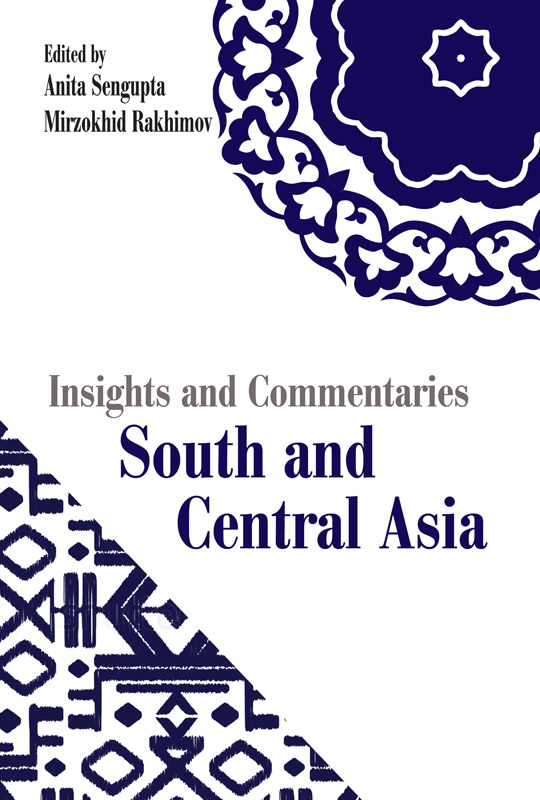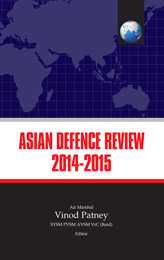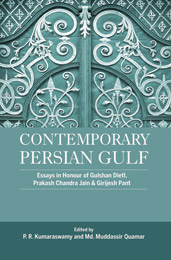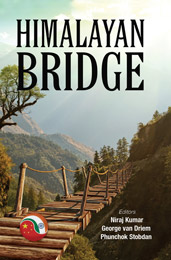Subjects
Recent View(s)
Insights and Commentaries: South and Central Asia
Anita Sengupta and Mirzokhid Rakhimov
Insights and Commentaries: south and central Asia
Edited by Anita Sengupta and Mirzokhid Rakhimov
Book
This volume emerged out of a search for scholarship that has studied connectivity between South and Central Asia from a variety of perspectives. Geographically and culturally, the vision that India has had of the region she referred to as Central Asia is of a space extending across China westward upto the Aral Sea and including within it Balkh, Bukhara and Samarkand. The Indian fascination with the region extends to various levels as this is the region out of which invading tribes entered India, across whose Silk Routes trade flourished and also the region where Indian culture and religion spread. Keeping this in mind the volume begins with an overview of positions from which the region has been traditionally situated from the Indian perspective as also reflections on the current scenario in terms of the geopolitical transformations of recent times. It then moves on to examine the history of the political, cultural and economic connections between the two regions from comparative perspectives. Written by specialists from Uzbekistan the articles reflect on connections that had ancient roots and shared historical experiences. The first set of articles focus on the historical linkages between the two regions. Another set looks at similar developments in the region in terms of transformations in the socio-political life of the people as also in the economy. Encounters and the necessity of security cooperation between the two regions is the focus of a third set of articles. The second part of the volume looks into certain issues that are significant in both South and Central Asia. Written with Uzbek insight they reflect on Soviet and post-Soviet state policies on a range of issues from gender and maternity policies, ethnic policies and social stratification, information policy and policies related to global organizations that have comparable relevance in the Indian context.
Author
Anita Sengupta is Fellow at the Maulana Abul Kalam Azad Institute of Asian Studies, Kolkata, India—an autonomous institute under the Ministry of Culture, Government of India. Her work has been focused on the Eurasian region with Uzbekistan being her area of special interest. She has also worked extensively on Turkish politics. Her research interests include questions of boundaries and state formation, minorities and minority identity, gender, geopolitics, problems of transitional politics and culture in the Eurasian region. She has authored and edited a number of volumes on Eurasia and collaborated with scholars in a number of Universities and Institutes in Tashkent, Bishkek, Almaty, Ankara, Istanbul, Berlin and Washington. She can be contacted at anitasengupta@hotmail.com.
Mirzokhid Rakhimov is Head of the Department of Contemporary History and International Relations at the Institute of History of the Academy of Sciences of Uzbekistan and a Professor at the University of World Economy and Diplomacy in Tashkent. He received his PhD in 2001 and Habilitation in 2013 from The Institute of History, Academy of Sciences. His academic interests include contemporary history and politics in Central Asia and international and inter-regional relations in Central Asia. He has authored and edited several books and written a number of articles that have been published in Uzbekistan, India, USA, Germany, Russia, Kazakhstan, Belgium and other countries. He is a frequent speaker at international conferences and seminars. He can be contacted at mirzonur@yahoo.com, mirzohidr@mail.ru
Contents
Contributors
Introductory Essays
1. Situating Indian Studies on Central Asia Narratives, Discourses and Perceptions
Anita Sengupta
2. Indian Studies in Uzbekistan
Bakhtiyor Abidov, Azad Shamatov and Sirojiddin Nurmatov
Part 1: Linkages and Connections
3. The Great Indian Road: India–Central Asia–Transcaucasia
Edvard Rtveladze
4. From the History of Relations between Sogd and India
Bobur Goyibov
5. Indo–Bukharan Diplomatic Relations, 1572–1598: The Role of the Actors
Gulchekhra Sultonova and Scott C. Levi
6. From the Sultanate to the Mughals: Literary Sources as a Mirror of
Musical Relations between India and Central Asia
Dilorom Karomat
Reforms and Policies
7. Reformist Movement in the East and the Socio–Political Life of
Turkestan in the Early Twentieth Century
Rovshan Abdullaev
8. Turkestan and the Oriental World in the Context of Adequacy of Social Reform Ideas in the East
Dilorom Alimova
9. The Colonial Economic Policy in Russian Turkestan and British India: Similarities and Differences
Bakhtier Alimdzhanov
Encounters
10. Central Asia–South Asia: Cooperation in the Context of Prevention of Security Challenges in Eurasia
T. Marmontova and A. Khazmuratova
11. Afghanistan: A New Stage of Transition
Ildar Yakubov
12. Iranian Factor in the Geopolitics of Central and South Asia
Guli Yuldasheva
13. International Relations in Central Eurasia and Perspectives of Inter–Asian Partnership
Mirzokhid Rakhimov
Part 2: Issues: Gender, Ethnicity and Contemporary Policies
14. The Policy of the Soviet Government in the Area of Protection of Maternity in Uzbekistan (1920s–1930s)
Sanobar Shadmanova and Turdibay Shadmanov
15. Transformation of Gender Issues in the Twentieth–Early Twenty–First Century Uzbekistan
Gulnora Ganieva
16. Central Asia: Common Historical and Cultural Roots
Ranokhon Tursunova
17. Socio–Economic Stratification of Uzbekistan’s Population: Past and Present
Shavkat Rakhmatullaev
18. Ethnic Policy and Inter–Ethnic Relations in Contemporary Uzbekistan
Ravshan Nazarov
19. Ethnic Minorities in Uzbekistan: The Case of the Koreans
Michael Ten
20. Information Policy in Central Asian Countries: Trends and Priorities
Nazokat Kasymova and Khursana Usmanova
21. Central Asian Republics and the United Nations
Oybek Abdimuminov and Umid Narzullayev
An Annotated Bibliography of Selected Books on Uzbekistan
in the MAKAIAS Library
Susmita Bhattacharya


 Political Science
Political Science



